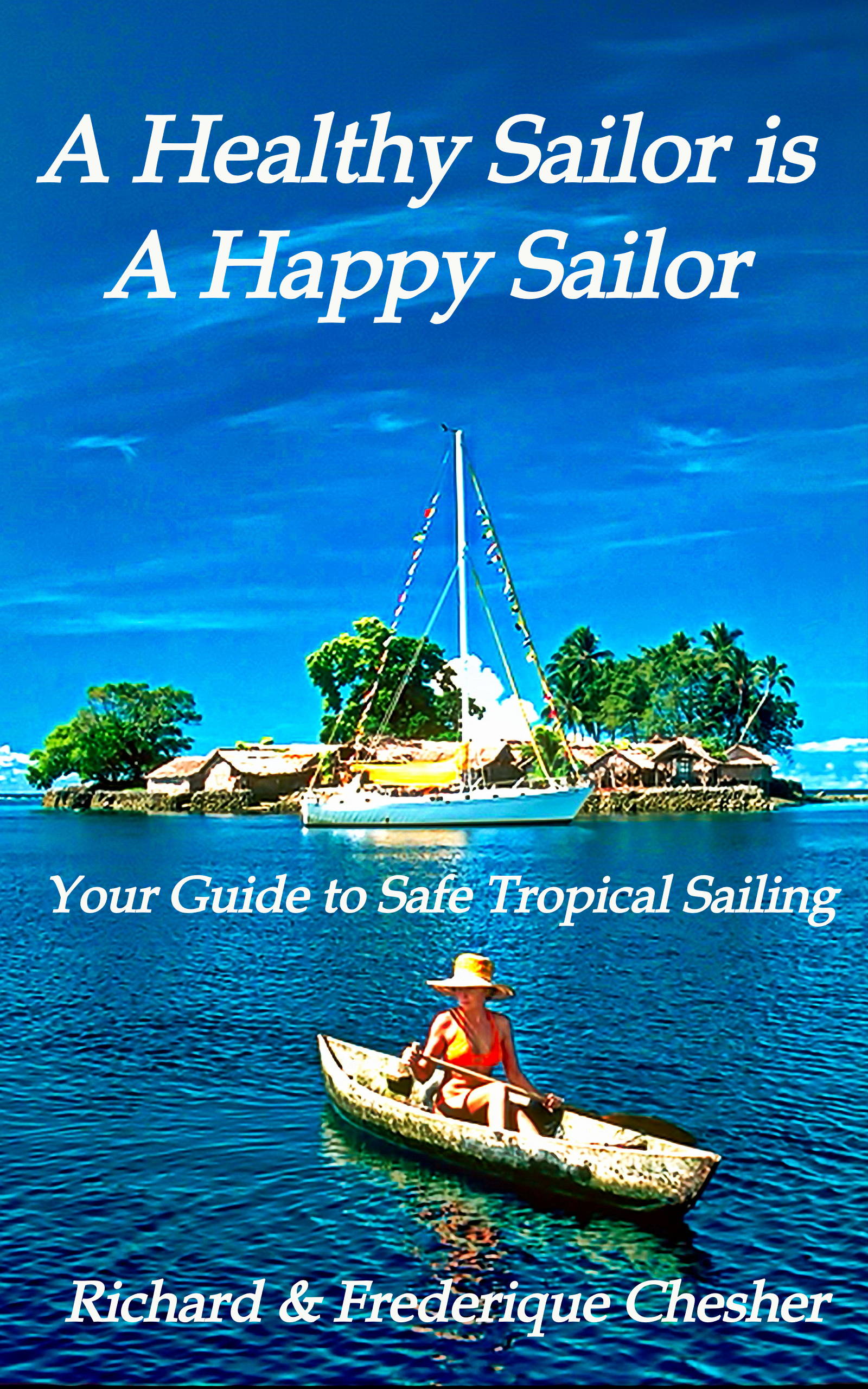Stay healthy while cruising
Frederique and I have been cruising for over 50 years in remote areas of Vanuatu, the Solomon Islands, PNG and New Caledonia and we have never had malaria or dengue. We rely on each other for any medical emergency and have become specialists in preventative medicine aboard a cruising yacht.

A Healthy Sailor is a Happy Sailor
In 2024 we published an ebook on how to avoid the multitude of health hazards cruisers are exposed to when sailing in tropical areas. "A Healthy Cruiser is a Happy Cruiser" It was Noonsite's Book of the Month the next month. You can order it, get it instantly online and you'll save youself some serious grief with some wonderfully easy - even fun - preventative health and safety risk avoidance measures. The book will give you all the details on how we have kept from getting these deadly diseases so you can cruise with confidence and safety. You'll also get the latest information on what to do if you don't follow our advise and you or one of your crew gets dengue or malaria.Order it on Amazon.
Malaria in Vanuatu and other health issues for cruising yachts.
Malaria and Dengue Fever
Malaria is a serious problem in Vanuatu - and it is only one of several diseases you can get from mosquito bites. The further north you go, the worse the risk of malaria. There have been cases of malaria that originated in Efate and even in Port Vila, but these probably came from carriers of the disease from more northerly islands.
Malaria is deadly and depending on when and where the symptoms start you can be in very big trouble very quickly. In addition to Malaria, mosquitoes in all the islands of Vanuatu can infect you with one of several varieties of blood virus commonly called dengue fever.
Of the two major mosquito borne diseases malaria is by far the most dangerous but dengue fever also kills people and is much more common - and therefore a greater risk. Dengue fever is carried by "domestic" mosquitos that thrive near villages. They also bite during the daytime, but are more likely to attack during dusk and dawn.
We had a friend who took one of those prescription anti-malaria propholactics for two weeks. She wound up in the hospital in Sydney with her face swollen to twice it's normal size and serious problems with her liver. These "propholactic" drugs can have serious side effects and many of the drugs that used to be effective against malaria no longer work. Plus none of them help with Dengue Fever.
You won't need to worry about taking drugs to prevent or cure Malaria or Dengue if you get our ebook and follow it's easy, inexpensive directions.
Water borne parasites and diseases
In the tropics, shore water is potentially a source of a wide range of pathogens. Do not believe shore water is safe because it comes from a city water supply or a nice clean looking creek in the islands where local people get their drinking water. Vanuatu doctors often say water borne parasites are not a serious problem in Vanuatu but as a consultant to the UN for 20 years examining pollution sources in the Pacific Islands I know you should never risk drinking shore water anywhere in the Pacific Islands without taking certain precautions.
Shore water can also be contaminated with heavy metals and chemicals that can harm your health if you drink it for a long time (like filling your water tanks with it and drinking it for weeks or months). I'm speaking from personal experience. Freddy and I nearly died from drinking contaminated water in Papua New Guinea in 1979. We were sick for months and would have died for sure if we had gone to the PNG hospital. Want the full scary details? click here and read the PNG chapter in the second book.
You really should have a good water-maker onboard, but if you don't, our ebook A Healthy Sailor is a Happy Sailor will tell you exactly how to avoid getting sick from shore water. And that's worth alot.
Marine cuts and abrasions
Any cut or abrasion that you get in the marine environment (including when scrubbing the bottom of your boat or cleaning the propeller) is a risk of serious infection. We know a yachtie that got a small cut on his ankle while cruising in Vanuatu last year. He ignored it and by the time he arrived back in New Caledonia his ankle was horribly infected. The infection had eaten right down to the bone and he very nearly had to have his lower leg amputated. He was in the hospital for over a month. What do you think THAT cost?
If he had known the simple, easy, inexpensive way to prevent marine infections described in the health section of our cruising guide to Vanuatu and our ebook he would have avoided all that pain, lost time, and expense. This one tip alone is worth the cost of our cruising guide.
Dangerous Marine Animals
Vanuatu has an assortment of dangerous marine creatures including sea snakes, poisonous cone shells, stone fish, sting rays, sharks and even crocodiles. The vast majority of these won't be an issue as long as you take certain precautions. But sharks and crocodiles are very real problems in certain areas. There have been yachties bitten and even killed by sharks in Vanuatu. Our cruising guide has shark warnings in anchorages that are known to be unsafe and includes instructions on how to avoid being attacked and what to do if you happen to come face to jaws with a shark.
In 2016 a man from a yacht was killed by a shark in New Caledonia. His yacht didn't have our guide to New Caledonia so the captain and crew did not know that the area where they were kite surfing was known to be a major shark risk due to a fish processing plant that used to dump it's offal in that particular reef pass. A kite surfer had been killed in exactly the same location just a few years previously.
Believe me, prevention of any health or life threatening incident that keeps you and your loved ones well away from the hospital in Port Vila is worth the cost of our cruising guide.
